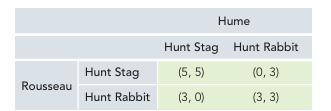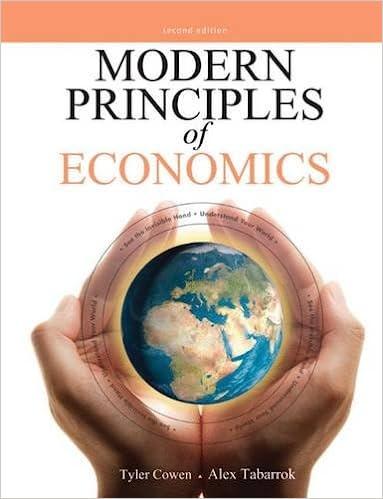Prisoners dilemmas are common in real life, but not all real-life games are as dismal as the
Question:
Prisoner’s dilemmas are common in real life, but not all real-life games are as dismal as the prisoner’s dilemma. One game, known as “stag hunt,” describes situations where cooperation is possible but fragile. The philosopher Jean-Jacques Rousseau described the game. He said that a lot of social situations are like going hunting with a friend: If you both agree to hunt for a large male deer (a stag), then you each have to hold your positions near each end of a valley so that the animal can’t escape.
If you both hold to your positions, then you will almost surely get your kill. If one hunter wanders off to hunt the easier-to-find rabbit, however, then the stag will almost surely get away. Rabbit hunting works fine as a solo sport, but to catch a deer, you need a team effort.
This is the usual way of writing the game: nju54

a. If Rousseau is quite sure that Hume will hunt stag, will he also hunt stag?
b. If Rousseau is quite sure that Hume will hunt rabbit, will Rousseau still hunt stag?
c. There are two Nash equilibria here: What are they? (Check by looking in each box and asking, “Would one player unilaterally change his choice between rabbit and stag?
If so, this isn’t an equilibrium.”)
d. Of these two equilibria, economists call one the “payoff-dominant equilibrium” and the other the “risk-dominant equilibrium.”
You can figure out which is which by the process of elimination. What do you think is the biggest risk that might push someone to choose the “risk-dominant equilibrium”?
e. Is this a coordination game or is there a dominant strategy?
f. In the coordination games we looked at in previous questions, if you failed to coordinate, things turned out badly. Is that the case here?
g. Anytime someone says, “I’ll do it as long as I’m not the only one,” they’re probably describing a stag hunt. Wearing a cocktail dress to a dinner party, making a solid team effort, keeping your lawn mowed—all might be examples of stag hunts. In a stag hunt, if you think the other players are nice, then you’ll want to be nice yourself. But if you suspect they’re not nice, you’ll probably just be a “rugged individualist” and go hunt the rabbit on your own.
With this in mind, think of two more examples of stag hunt situations on your own.
(For an excellent, somewhat technical treatment of how people might agree to hunt stag across many areas of life, see Skyrms, Brian. 2004.
The Stag Hunt and the Evolution of Social Structure.
Cambridge, UK: Cambridge University Press.
Skyrms is a philosopher who uses the tools of game theory to investigate important social questions.)
Step by Step Answer:






